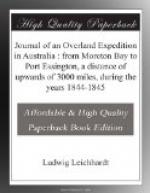Dec. 9.—The natives came to our camp at break of day, and Bilge introduced several old warriors of a different tribe, adding always the number of piccaninies that each of them had; they appeared very particular about the latter, and one of the gentlemen corrected Bilge very seriously when he mentioned only two instead of three. Bilge had promised to go with us to Balanda, but, having probably talked the matter over during the night, with his wife, he changed his intentions; but invited us in the most urgent manner, to stay a day at their camp. Although no place could be found more favourable for feed and water, and a day’s rest would have proved very beneficial to our cattle, yet our meat bags, on which we now solely depended, were so much reduced, that every day of travelling was of the greatest importance; as the natives told us that four days would bring us to the Peninsula, and two more to Balanda. We crossed the plain to the westward, in order to avoid the low rocks and rocky walls which bounded this fine country to the north and east. After about three miles, however, we turned to the northward, and travelled with ease through an open undulating forest, interrupted by some tea-tree hollows. Just before entering the forest, Brown observed the track of a buffalo on the rich grassy inlets between the rocks. After proceeding about five miles we crossed a chain of fine Nymphaea ponds; and, at five miles farther, we came upon a path of the natives, which we followed to the eastward, along a drooping tea-tree swamp, in the outlet of which we found good water. Our lat. was 11 degrees 56 minutes; about ten miles and a half north by east, from Bilge’s lagoon. Mitrasacme elata, and all the other little plants I have before mentioned, were growing in the stringy-bark forest. A flight of whistling ducks came at night, and alighted on the ground near our camp; but departed as soon as they saw us moving. Tracks of buffaloes were again observed by Charley. The night was clear and very dry.




